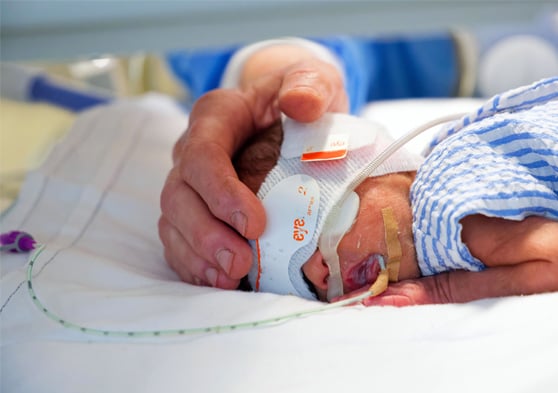About our Study
The CIRCA DIEM study is a multicentre, prospective, open, blinded end-point (PROBE) parallel controlled study. The study aims to understand if day/night cycling of environmental light and noise improves brain development of premature babies compared to nursing premature babies in a hospital ward with similar light and noise levels throughout the day and the night.
Babies randomised to the intervention group will experience “night” by wearing little black-out eye masks and silicone ear-plugs to exclude light from shining in their eyes and reduce their perception of noise at night when they are in hospital during the first weeks of their life. Then, during the daytime, the eye masks and earplugs are removed so that the babies in the “cycled” group experience “daytime”. Babies randomised to the control group will receive standard care, which involves relatively constant light and noise levels throughout the day and the night.
We expect the study to answer the question of whether cycling of light and noise promotes earlier development of their internal circadian rhythms earlier than they would normally do during their first weeks in hospital after they are born and if earlier development of a circadian rhythm promotes better development for children born very preterm.
The CIRCA DIEM Study aims to recruit and enrol 954 babies. Recruitment commenced in 2019.
- 599 babies recruited to CIRCA DIEM
- 202 completed 2 year follow-up appointments
What are circadian rhythms?
The circadian rhythm is the body’s ‘internal clock’ which controls many biological processes and behaviours. The body’s circadian rhythm usually aligns with day and night.
Alternating light and dark cycles are a critical part of the signal that is sent to the brain to release the hormones necessary for sleepiness (melatonin) and wakefulness (cortisol). Sleep without interruption is important for brain development and overall health.
Circadian rhythms are vital for normal fetal development, especially for development of the brain. While in the uterus, the developing fetus is dependent on their mother’s circadian rhythms until a few days before birth.
Premature infants have to develop without the benefit of these circadian signals from their mother. Instead, they spend the first weeks of their lives cared for in incubators in Neonatal Intensive Care Units (NICUs) exposed to the constant light and noise of the hospital environment. Premature babies nursed in hospital environments with constant levels of light and noise do not develop a circadian rhythm until around 6-8 weeks after they are discharged home.














